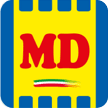- Home
- /
- Success stories
- /
- Managed Services
- /
- MD – History
Success story
MD: story of organic and solid growth.
deda tech included the analysis of existing infrastructure, identifying the most suitable type of Cloud to be implemented by the customer.
MD is one of the most dynamic players in Italian retail, a business that runs fast, always on, geographically distributed and among the Italian pioneers also in e-commerce, with a portal dedicated to non-food.
One of the challenges it faces every day is to guarantee its services and the continuous distribution of products with highly innovative technological solutions.
THE CLIENT.
He has been depicting Italian beauty and courage since 1994.Launch of Managed Services for IT infrastructure management following the merger and incorporation of the Lombardini Discount (LD) chain-which will double the number of stores in the territory. A process that left the client’s resources free to take care of the point-of-sale integration with the transfer of data from LD’s Mersy ERP to the Linfa system in MD.
Migration of the operating environment to the Rome Data Center with retention of the Gricignano facilities as the second Plant. Expansion of IT infrastructure and initiation of Business Intelligence project to govern active outlets throughout the country.
Networking development of CeDi’s to connect with more peripheral branches (e.g., Macomer- NU) with the start of the experience, still active today, on Emisphere wired antennas Launch of the first SAP project on IaaS delivered in deda tech Data Centers.
Expansion of infrastructure Cyber Security services and launch of active monitoring services. Cedi network upgrading of Bitonto, Dittaino, Santa Giusta and Verdellino. The networking of the CeDi in Gricignano (the main one) is adjusted.
Start new IAAS services to go to storage needs (file servers) or for specific projects (Hadoop). Started Business and Consumer WiFi connectivity on the first 30 stores in the network (expanded to an additional 80 in 2020) and put the linux systems update service (sms4prm) into full operation.
New upgrades on CeDi and activation of SAP Hana services in IaaS. Complete and transparent switch of all MD IT from a predominantly on-premises logic to an entirely as a Service and Multicloud model.
SCENARIO
MD needed to revamp its core systems, ensuring full operability of the facilities.Proposal and solution
Renew core systems to help customers achieve important business goals.
Having shifted from a Capex to an Opex investment rationale freed us from investment constraints and proved to be a key strategic choice, giving us a competitive advantage over our competitors and providing the flexibility we needed not to halt infrastructure development and ensure business continuity



